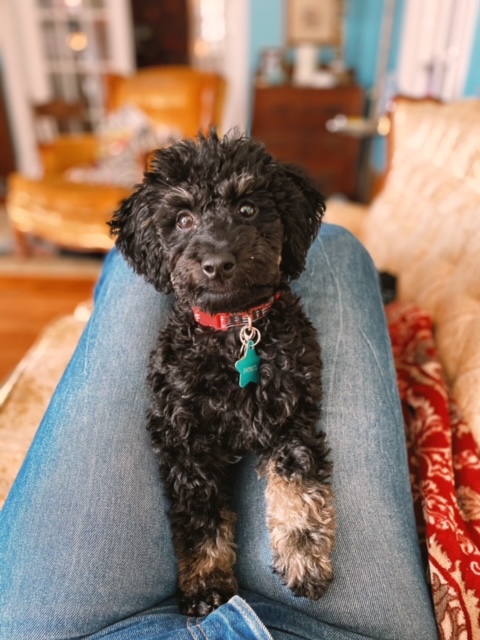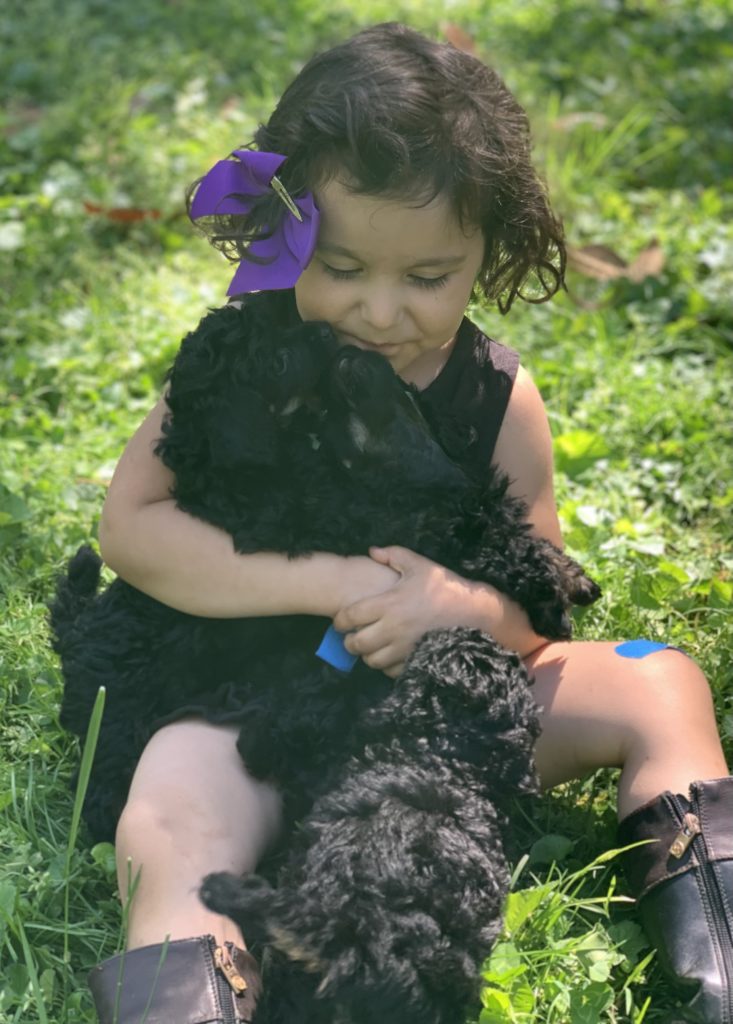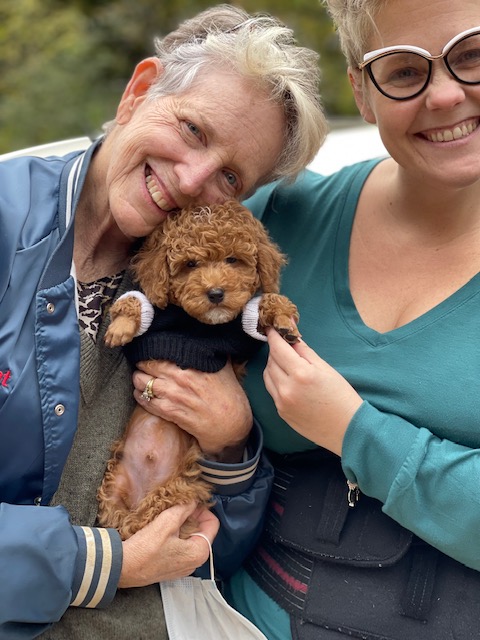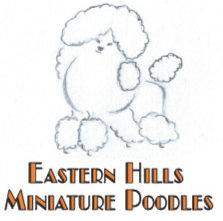About Our Unparalleled Poodle Puppies

Proven Foundation
We use Early Neurological Stimulation on a litter to litter basis as well as short individual training sessions with each puppy at specific milestones in their growth. From birth through to the first 12 weeks in puppies life is a critical time. That is why finding a breeder that invests in your puppy is so priceless!
Most importantly, every puppy is loved and raised in our home with our family, which, combined with the Puppy Culture Method, gives them the best foundation possible.

Raised With Love
What sets us apart is how we raise our poodles. We are passionate about our puppies and we find so much satisfaction knowing that any of our puppies that you choose will be given an amazing foundation on crate training, leash training, basic manners, potty training and most importantly, you will be bringing home a confident social puppy that you can build a relationship with thanks to the Puppy Culture method of raising our puppies and the love we give to each of our babies.

Unsurpassed Companion
We truly believe that the first twelve weeks are crucial to a dogs life and their ability to communicate with their family which is directly related to getting a companion of a lifetime! A puppy you will bond with and that will enrich your life!
"The Proof Is In The Puppies"

Puppy Culture is a program developed by Jane Killion, professional dog trainer and
breeder. It is a comprehensive, organized program for breeders to follow during the
first weeks of a puppy’s life. This has been invaluable in giving our puppies the best
start in life.
It has taken most of the best puppy husbandry practices from over the last 50 years
and formalized them into a systematic program. What we like best about Puppy
Culture is that it has connected each protocol to specific developmental markers.
This makes it much easier and effective to not only do the right thing, but to do it at
the right time for the best results.
Prenatal Period:
A puppy’s ability to form deep and meaningful relationships starts even before they
are born. We make sure that we choose pairings that will create beautiful, but most
importantly, healthy puppies. The physical and emotional health of the mother will
affect the health of her puppies. Research has shown that puppies born to mothers
that receive prenatal massages are more docile and enjoy being touched, so we
make sure that we spoil our mommies with lots of affection and belly rubs.
Neonatal Period: 0-14 days
Early Neurological Stimulation (ENS) begins on day 3 and continues through day 16.
Research shows that tiny struggles and stresses in appropriate small doses are
actually good for puppies and will help them grow into strong, healthy well-adjusted
adults. Some of the benefits to ENS are greater tolerance to stress, they have better
immune systems and tend to be able to resist disease, they have faster adrenal
system, stronger heart rate and stronger heartbeat. This is a gift that a breeder can
only give their puppies once during the window of 3-16 days and can impact the
puppies for the rest of their lives.
Transitional Period: 14-21 days
When the transitional period begins will vary from litter-to-litter. Behavioral markers
are used to identify the beginning and end of each developmental period. The
transitional period begins when the puppy’s eyes open and ends when they first
startle upon hearing sounds. We give our puppies individual cuddle sessions and
introduce a new experience and/or thing each day.
Puppies at this age are not able to hold their urine however they do have the instinct
to “keep their nest clean” by moving away from their nest to use the potty. We
surround where they sleep with potty pads and make their nest area smaller so that
they will be able to clear it in 1-2 steps. We are trying to define, not a potty area, a
nest area. This is a first step towards eventual potty training
Critical Socialization Period: 3-12 weeks
Having 4 kids that vary in age allows our puppies to learn how to react when being
handled by children of all ages. We also introduce them to the other dogs in our
family that we know behave well with the puppies. Most people think of socialization
as exposing their puppies to as many new
experiences as possible while the puppy is young. While this is part of the process,
it’s not enough. We want to raise dogs that have the emotional ability to connect with
you. There are 7 key things that build the emotional intelligence of a puppy.
1: Communication – giving a puppy his own voice. Communication between humans
and animals is very important (Communication Trinity – (power up clicker, box game,
manding), attention/distraction protocols)
2: Emotional stability – the ability to recover easily from fear and stress (startle
recovery, barrier challenges,)
3: Habituation – familiarity with the maximum number of things (Puppy Parties, sound
protocols, habituation soundtracks and noises, meeting different people, dogs, other
animals)
4: Enrichment – the view that novelty and challenges are opportunities for enrichment
rather than things to be feared or avoided (novelty items, Adventure Box, off
premises socialization)
5: Health – physical wellness and motor skills that will allow the puppy to develop in a
neurologically and physically sound way (daily weight checks, grooming,
vaccinations, deworming, proper nutrition, vet health checks)
6: Skills – learned behaviors which allow him to function in human society (recall,
manding, simple commands, litter box training, crate training, leash walking, resource
guarding, bite inhibition)
7: Love – the desire to seek out the company of both dogs and humans as
emotionally positive experiences (shaping emotional responses, Happy and Calm
CER (Conditioned Emotional Responses),daily cuddles with humans and mom).
Weeks 8-12: Puppies go home with their families. This gives them a time window in
that critical socialization period to adjust to their new family’s lifestyle and be
introduced to new people and experiences.
“The proof is in the puppies”
NOTE: Puppy Culture has become a very popular program among puppy buyers.
Because of this, breeders are realizing they can make more sales if they say they
use Puppy Culture. Some breeders think that throwing some toys in the pen and
doing ENS is Puppy Culture. But it’s not. Be sure any breeder who says they use
Puppy Culture actually shows you the proof.
For more information please email us at easternhillspoodles@gmail.com or go to
their official website at shoppuppyculture.com.
We begin the potty training process as soon as pups start crawling away from their sleeping area to potty around 2 weeks. This is done by distinguishing a specific sleeping area. We systematically continue to expand sleep/play area as they grow. Your puppy will learn to potty in a litter box, training pads and outside. Litter box = your puppy will be well on their way to being completely potty trained. We are here to support you during this process.
(Although our puppies do an amazing job with potty training, you should never expect zero accidents. Accidents happen at any age. Purchase some enzymatic cleaner to have on hand to clean up when an accident happens, and try not to overreact, otherwise puppy may think they need to hide from you to potty and be afraid to go in front of you when you take them out.)
We do not have a wait list. However when you place your $350 deposit you are added to our deposit list. The deposits we take are limited based on the mommies and how many puppies they have had in the past. After the litter is born if we have more than we took deposits for we will reopen deposits. People can choose their puppy in the order the deposits were placed. If you were not able to get the gender or coloring that you wanted you can transfer your deposit to their next litter or, the next available litter, a limited amount of times. Deposits are non-refundable.
If you have more questions about the deposits, email, call or text.
The deposit is $350 and is credit towards the final balance of your puppy.
Deposits can be sent through Venmo or PayPal (friends and family only). We will also accept a personal check or cash.
We do not hold your puppy until deposit has been received.
(final payment must be paid Venmo or cash)
It’s true that you get what you pay for. We could raise cheap puppies, those poor babies are usually the ones that end up abandoned or filling up the shelters. We strongly feel that the only way to end that terrible cycle is through education and raising social, confident and loved puppies. Your help is needed to support great breeders and end the cycle.
We choose to give our poodles and their puppies the best. That is priceless.
We send our puppies home when they are just over 9 weeks old. There is five days flexibility when picking up your puppy.
If you need us to hold your puppy for an extended period after the 9 weeks there may be a boarding fee.
You will need :
- Metal comb
- Pin brush
- Pet bed
- Nail Clippers
- Toothbrush
- Collar/harness and leash
- Shampoo and conditioner
- Toys and treats
- Dog food – I use Farmina dog food for our dogs. There will be four sample packs of Farmina included in the puppy bag.
- Water and food bowls
- Puppy pen
- Kennel XS/Small
- Litter box/paper litter pellets
- Enzymatic cleaner
- Probiotics
- A good groomer
If you are grooming the puppy yourself you will also need these additional items:
-
- Ear cleanser
- Pet clippers and blades
- Pet grooming shears
For training your puppy Please visit the website Madcap University, sponsored by puppy culture. This is a free four week video course that focuses on the tools needed to be successful during the first weeks with your puppy. I recommend watching this before and again after getting your puppy 😀 Although you still need to “purchase” the course from the Madcap University Shop, you won’t need to pay anything!
What is in the Puppy Bag?
- A homemade blanket
- A toothbrush
- A treat baggy
- Nylabone
- 1 plush toy
- 1 chew toy
- A miscellaneous item
- Potty pads
- 4 days of dog food
- A measuring cup
- A nylon pull string bag
- Puppy folder
Microchipping
Microchipping is part of your puppy package and it is implanted into every puppy in our program. The chip and implantation is of no cost to you, but you will still have a $25.00 registration fee to implement once you get home. There will be a microchip card in your customer folder that will tell you exactly what number to call to get your puppy registered.
Every year puppies and dogs go missing for various reasons. We like to offer peace of mind through this service while providing it at a discount. Some vets can charge between $55.00 to $100.00.
Microchips are injected into the animal just as you would inject a vaccine. It is about the size of a grain of rice and is inserted in the pocket between the shoulder blades. You will also have to call to register the microchip or register online. The forms needed for registering your puppy will be located in the puppy folder which you’ll receive when you pick up the puppy.
The microchip will contain all your contact information. Once it is injected it can be read by a scanner when your puppy is found or turned in.
We will keep your puppy for an extra 3 weeks and he will be taught basic commands and we will continue to potty train, leash train and crate train. This will be an additional $2,000 which includes the puppy training, vaccinations, bathing, grooming, and feeding of the puppy.
We feed our dogs and more mature puppies Farmina Pet Foods. Farmina is a family-run Italian pet food company that focuses on developing highly nutritious, all-natural pet foods based on scientific research. All three lines of its dog food — Farmina Vet Life,Natural & Delicious Grain-Free, and Natural & Delicious Ancestral Grain — contain no artificial preservatives and no genetically modified organisms (GMO free). Farmina promotes sustainable farming practices and conducts only cruelty-free research.
The high-quality ingredients, as well as the emphasis on scientific research, make Farmina a premium dog food company. For more information visit their website at www.farmina.com.
For weaning our younger puppies (when we begin weaning varies from litter to litter, but usually starts when they are around 14-21 days old) we follow the Puppy Culture method. Starting them off with a tiny bit of goat’s milk in the bottom of a pie plate, just to get them used to lapping liquids. After about a week we’ll give them goat milk meals to replace a feeding or two each day. Eventually we’ll add lean ground venison to a bowl of warm goat’s milk and gradually incorporate the Farmina dog food until that is their main dish with an occasional bowl of Goats milk on the side. Once again this is a gradual process.
BY CAR
We do meet customers to deliver puppies and try to meet them halfway. We will travel 3 hours in one direction if we can accommodate. We will calculate a fee based on gas, time, and possible hotel service.
We cannot guarantee delivery by car. Scheduling will go off of our set locations and availability only.
SHIPPING BY AIR
(WE DO NOT SHIP CARGO, IN CABIN FLIGHTS WITH A NANNY ONLY)
1). You can fly into Nashville, and we can meet you with your puppy. You can schedule a return flight and have the puppy with you in a soft sided carrier. You will need to pay an extra fee to check your puppy in with you on the flight. Be sure and check with the airline what the fee is and what guidelines they have in place.
2). We can fly the puppy to you departing from Nashville to an airport of your choice. You will pay for the round trip Airline ticket, the in-cabin pet fee,for the gas/mileage round trip to the airport, parking fee and a reasonable charge for travel expense and time.
CUSTOMER FLYING TO US
We can meet at curbside departures or we can meet inside if you pay for parking. You will need to book a flight with your puppies age regulation in mind. Your puppy will only be 9 weeks of age so you cannot book a flight that requires the dog to be 10 weeks to fly.
Regulations do change so please do your own research.
